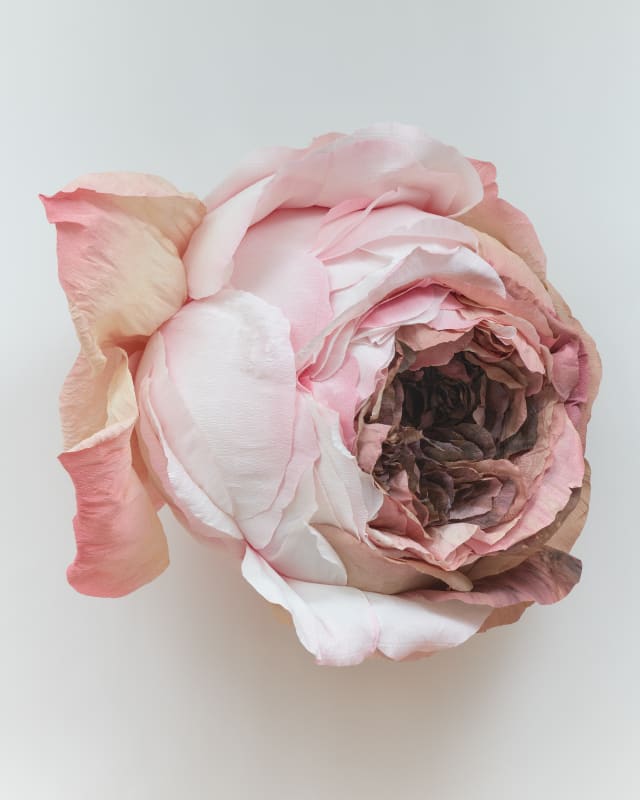In preparing for her newest body of work, Tiffanie Turner sowed three ideas: to expand the standard shapes of her sculptures, to draw underrecognized connections, and to unearth a long-held concern about American culture.
An architect by training, the artist (previously) is known for her incredibly lifelike paper flowers that explore beauty standards and aging through dramatic decay and flawed growths. Her interests in recent years have largely been universal, questioning the nature of imperfection and human vanity or the impending destruction caused by the climate crisis.
But in American Grown, Turner turns toward the personal. Two and a half years in the making, the series comprises ten massive sculptures made with the artist’s signature crepe-paper petals layered in dense masses. The flowers embody both an artistic challenge—one of the three principles behind the collection was to leave behind the circular, wall-mounted form in favor of more conical, gravity-defying constructions—and a deeply introspective look at Turner’s own life. “After spending over two years with this body of work, thinking almost every day about where this idea of the United States being ‘the greatest nation’ in the family I grew up in, I think I figured it out,” she tells Colossal, sharing that she’s circling around how American exceptionalism is deeply rooted in culture and often passed through generations.
The idea for this body of work came about during the first year of the Covid-19 pandemic “when her shame about being an American was at an all-time high. A cartoon of an American was swirling in her head: a styleless, gun-loving, misogynistic, God-fearing racist,” a statement says. Like her earlier pieces, Turner returned to universality as she realized that these traits are not always unique to the U.S. Instead, she used that caricature as a starting point to explore this belief in superiority and to connect to “her childhood, comparing and contrasting the standards and safeguards around the raising of her two children with memories of her grandparents and parents, focusing on the past, present, and future, in the timeframe of 1950 to 2050.”
Ephemerality is inherent in Turner’s blossoms, as she preserves the fleeting state of freshness in paper. But where earlier works featured browning petals on the outer edges, those in American Grown are central. A dark rot emanates from the inside of “Excerpt from Still Life with flowers on a marble tabletop”—this piece takes its title from a Rachel Ruysch painting—while the base of the towering “Croquembouche” is laced with decay, suggesting that there’s something insidious not on the fringe but directly at the heart.
The final tenet of the series is discovery and connection. Turner references the two-headed “Cocksome Rose,” which resembles a fasciated strawberry of the same name, and her desire to draw similarities between disparate objects. Even if viewers don’t connect the two misshapen forms, she hopes that “they will still wonder about the piece, and perhaps find something in it that [the artist] hasn’t yet seen.”
American Grown will be on view from September 9 to October 21 at Eleanor Harwood Gallery in San Francisco. Head to Instagram to glimpse Turner’s process and follow updates on her work.


